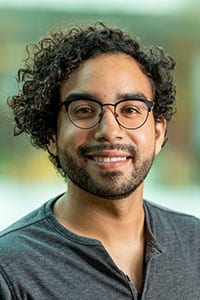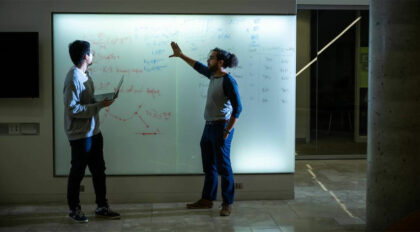Using machine learning to improve imaging in biology
Ed Evans was challenged by reading difficulties as a child, but his father worked tirelessly to help him overcome the problem by having him read National Geographic magazines aloud. When Evans made a mistake, his father gently corrected him.
His prolific reading of the stacks of magazines in his Daly City, Calif. home ignited in Evans a passion for science and discovery – ultimately leading him to the Morgridge Institute for Research.

“I love Star Trek. I wanted to be in space with Picard and Captain Kirk, so I developed a love for astronomy and physics,” Evans recalls. “Later, I found out that I wasn’t great at math, so that was kind of out the window. But biology was something that I really loved.”
Participating in a high school program called the Gene Connection, which ran simple PCRs and amplified genes, Evans was the only student in the class whose experiment failed.
“I didn’t care, though. I loved it and I was hooked,” he says. “I wanted to do it after my first failure, and science is full of failures.”
In college at San Francisco State University, he did unpaid undergraduate research in an avian parasitology lab. He was first author on a paper on the genetics of a small tropical bird, got a degree in cell and molecular biology and nurtured an interest in virology – one of the topics of a National Geographic story he read out loud years earlier.
Evans came to the University of Wisconsin–Madison for doctoral work because of its history of excellence in virology. As a doctoral student, he worked with Professor Nathan Scherer doing research in reactions between HIV and its host, hoping to find a means to replicate in humans the immunity that mice have to the virus.
There, he leaned heavily on his capacity to do bioinformatics with different species and earned his Ph.D. in cancer biology in 2019. “But I didn’t do any cancer biology at all. It was all virology,” he says.
In 2020, he was named a Morgridge Postdoctoral Fellow and joined Professor Kevin Eliceiri in the Laboratory for Optics and Computational Instrumentation (LOCI) at UW–Madison, where he is now a staff scientist.
Evans uses his bioinformatics background to integrate machine learning technologies into ImageJ, a software platform developed by the National Institutes for Health to analyze microscopic images.
“The beauty of it is that it lets people write plug-ins that can extend the functionality of the program,” says Evans. “I sit as a mediator. I want to make tools. So, if a scientist comes to me and wants to segment images of nuclei and cytoplasm and get their geometry, I have the technical background to do that.”
Although Evans enjoys wet-side lab work, he draws immense satisfaction from solving problems and seeing the more immediate effects of his work.
“It takes a long time to publish lab results. But I get to make code fixes and develop new tools rapidly,” Evans says. “If I fix a bug in ImageJ, I’ve made it better for scientists across the globe and made science happen better. That’s impactful.”

Rising Sparks: Early Career Stars
Rising Sparks is a monthly profile series exploring the personal inspirations and professional goals of early-career scientists at the Morgridge Institute.
